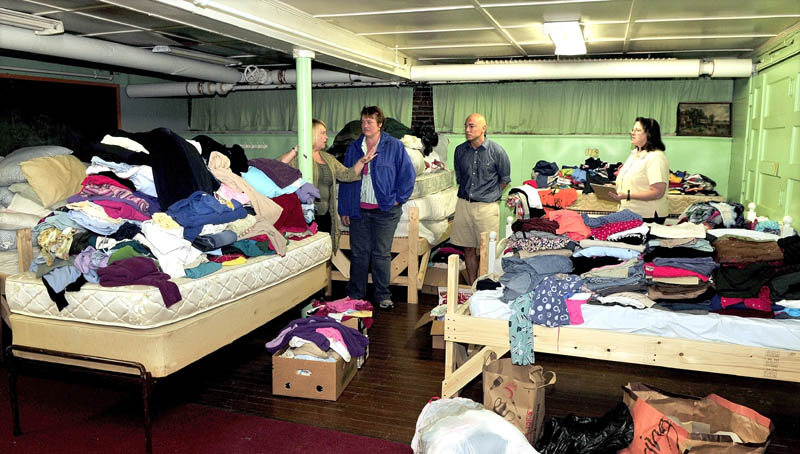WATERVILLE — With winter on its way, volunteers are preparing to re-open a temporary overnight homeless shelter in the basement of the First Baptist Church.
The overflow shelter, which opens Tuesday, Nov. 1, is for people who cannot be housed at the Mid-Maine Homeless Shelter on Ticonic Street. The Waterville Area Homeless Action Group, which works with the Mid-Maine Homeless Shelter, organizes the overflow location.
The group met recently in the basement of the church at the corner of Elm and Park streets. Members discussed needs for this winter’s overflow shelter, including financial donations and twin beds with frames.
The 32-bed overflow shelter opened for the first time last year and closed in April. The operating cost for the winter was $18,000, according to Betty Palmer, executive director of the Mid-Maine Homeless Shelter.
“We were short volunteers so we had to hire staff,” Palmer said. “That’s still not bad. It was one-third of the cost of using motel space.”
The shelter survives on fundraising. So far, about $4,000 of the needed $18,000 has been raised and donated.
“We’re putting our trust in the generosity of the community,” said Arlene Tully, pastor of the Pleasant Street United Methodist Church and a Homeless Action Group member and shelter volunteer.
This season, organizers are planning to expand the number of beds to 40 or 45 to meet a growing demand, she said.
Homeless advocates plan to build a new $2.7 million, 40-bed Mid-Maine Homeless Shelter on Colby Circle in the coming months, so they expect this to be the final year the overflow shelter.
The overflow shelter opens at 6 p.m. and closes at 7 a.m. Two people staff the shelter at all times, and one may nap while the other works.
Tully and Palmer said last winter’s volunteers are being called to see if they will return this winter.
“It really takes 150-plus volunteers and we’re probably at about 60, by the looks of the calls,” Palmer said.
Tully said wireless Internet access will be available for the first time at the overflow shelter, so volunteers who need to do private work on the Internet may do so.
“We’re hoping that this year we’ll have better luck with people volunteering for overnight shifts because of the Internet,” she said.
The shifts are 5:45 p.m. to 10 p.m. or 11 p.m.; and 10 p.m. or 11 p.m. to 7 a.m.
Training for new volunteers includes information about confidentiality, mental health and homelessness.
The Ticonic Street shelter will house only families; the overflow shelter will house single people, Palmer and Tully said.
“Right now, we have 37 families on our waiting list (at the Ticonic Street shelter),” Palmer said. “We have 18 to 25 people there now. We have 127 people on our whole waiting list.”
She said those on the waiting list are currently staying with friends, “couch surfing” or sleeping anywhere they can.
“We have families still sleeping in tents,” she said.
Action Group member Dominic Dechaine, who works for the state Department of Health and Human Services, said people also are sleeping in the woods.
The number of homeless people living in this area is staggering, according to the group. Dechaine said when many people think of homelessness, they envision people lying on the streets in a city, but homelessness is very different in Maine.
“People sleep on porches, they sleep in sheds, out of the way,” he said.
Tully said that not everyone who is homeless comes to the shelter for help.
“I think people really underestimate the number of homeless people in our area,” she said.
The people who stayed at the overflow shelter last winter were good people and caused no problems, they said.
“Lots of them have been on the street all day,” Palmer said. “They’re cold, they’re exhausted, they just want a place to lie down and go to sleep. We had zero incidents (last winter). People were just so thankful to get a place to get out of the cold.”
The homeless people staying at both shelters receive help in breaking the cycle of homelessness, Tully said. They get connected with needed services, learn budgeting and other skills, and most are able to find housing.
“It’s not just warehousing people,” Tully said. “It’s getting them the services they need to get back on their feet and get stable housing.”
Fewer than 10 percent of people who stay at the shelters return there, according to Palmer.
“Last year, everyone was in permanent housing by the time we closed,” she said.
She and others said when people are homeless, they tend to go to emergency rooms and other places for help.
“As soon as you stabilize them in an apartment, they stop utilizing those services,” Dechaine said.
To sponsor a bed for a month at the overflow shelter, one may donate $115. A donation of $687 sponsors a bed for the entire winter.
During a tour of the overflow shelter, volunteers led the way through a maze of rooms where donated twin beds and boxes of clothes were waiting to be sorted and organized. Last year, Ware-Butler Building Supplies donated two-by-fours and Methodist church volunteers used them to build bed frames.
Tully said some people donated fresh fruit, which was a special treat at the shelter — and in great demand. Lots of places donate sweet desserts, so they are plentiful, according to Tully.
“But fresh fruit — that’s a rare commodity,” she said.
Amy Calder — 861-9247
acalder@centralmaine.com
Send questions/comments to the editors.




Comments are no longer available on this story